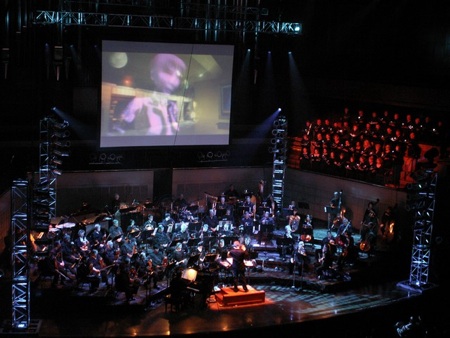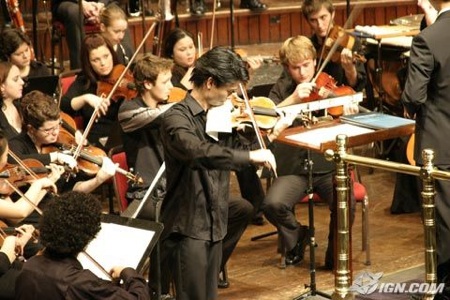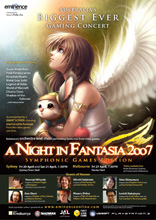Videogame Symphonies
It is only natural that music we hear constantly becomes comfort music. The next natural step is that it become classic. It is then only a tiny leap to become classical — as in a concert hall. The migration of videogame music — those tunes repeating endlessly in the background of your favorite game — to a symphonic performance is inevitable.
The first video game music concert was in Tokyo Japan in 1987. Music from Dragon Quest Suites I & II were performed. In the 20 years since, there have been many videogame music performances and CDs in Japan, but the first concert outside Japan is believed to be in 2003 when the Czech National Symphony Orchestra performed videogame music for the opening of a Games Convention in Germany.
The two major events these days are Play! A Videogame Symphony and Video Games Live, two global traveling shows featuring a medley of videogame music conducted by a local premier orchestra. The shows have played some 40 times in Singapore, Australia, Europe, Japan and North America. Both concert series are still going.

There is a little bit of kitsch listening to the small music of a video game buffed up into a harmonic symphony, but in fact some of the great symphonies of the past began as small tunes. This transformation is no stranger than making movies from small folk tales.
Recognizing the potential of videogame music, the Eminence Symphony Orchestra, based in Syndey, specializes in primarily performing the music of Japanese video games and anime.

The videogame music orchestra is directed by its first violinist, Hiroaki Yura. Their first concert in 2003 was dedicated to playing the music from Final Fantasy and Murizaki films (Totoro, Kiki, Nausicaa, etc.). They have also done concerts (and released CDs) of later Murizaki films, more games, and Star War themes.

Wired magazine ran a short piece on Mario Maestros by columnist Joel Stein, who has some good details. He writes:
[Tommy Tallarico] and Jack Wall, the conductor and cocreator of Video Games Live, figure out how to mimic bleeps and bloops with traditional instruments (Duck Hunt’s giggling dog, for instance, is re-created with trilling woodwinds). They coordinate light and video effects to complement the music. And then they license the whole package to symphony halls, where local musicians — most of whom are more familiar with Handel than Halo — perform the program under their guidance. “This is a market that is foreign to most of us,” concedes Randall Weiss, first violinist of Symphony Silicon Valley, which has performed both Video Games Live and a competing program called Play! A Videogame Symphony. As for the music itself? “I like it,” he says. “I think of it more like movie music.”
The concert halls love the videogame crowd.
“It’s an entryway,” says Kim Witman, director of classical and opera planning for Wolf Trap, an outdoor concert site near Washington, DC, which hosted Play! in 2006. “It’s bridging the gap — taking something that they know and using it to ease them into something unfamiliar.” Indeed, for anyone who hasn’t hit middle age, classical concert halls are pretty unfamiliar: Only 23 percent of classical music audiences are younger than 35. Video Games Live and Play!, on the other hand, pack every venue with twenty- and thirtysomethings, each paying up to $125 a ticket.
He then compares the contrasting styles of Video Games Live and Play! One is rock with smoke machines and one is tuxeodoed seriousness.
But their musical selections are nearly identical. Both start with a medley of classic games, rock out through the same bombastic soundtracks (World of Warcraft, Metal Gear Solid, Halo) that sound like Carl Orff’s Carmina Burana, launch into Disney’s Kingdom Hearts, and, for an encore, let loose with “One-Winged Angel” from Final Fantasy VII. For both shows, the same Japanese composers introduce their works in taped segments. Both beam game clips onto a giant screen while the orchestra plays. And both draw the same kind of audience — gamers dressed more for a day at Disneyland than a night on Broadway. “It’s easy to tell the Phantom of the Opera fans from the Video Games Live fans,” one concertgoer says. “Hopefully one day there won’t be such a disparity.”
A final quote pretty much sums up the trend.
Videogame symphonies offer something greater than fond memories — they offer nerd redemption. “It’s kind of a vindication, to hear that music being taken seriously,” says Josh Sievert, a 26-year-old motorcycle mechanic who attended a Play! concert in San Jose. “We’ve arrived.”


